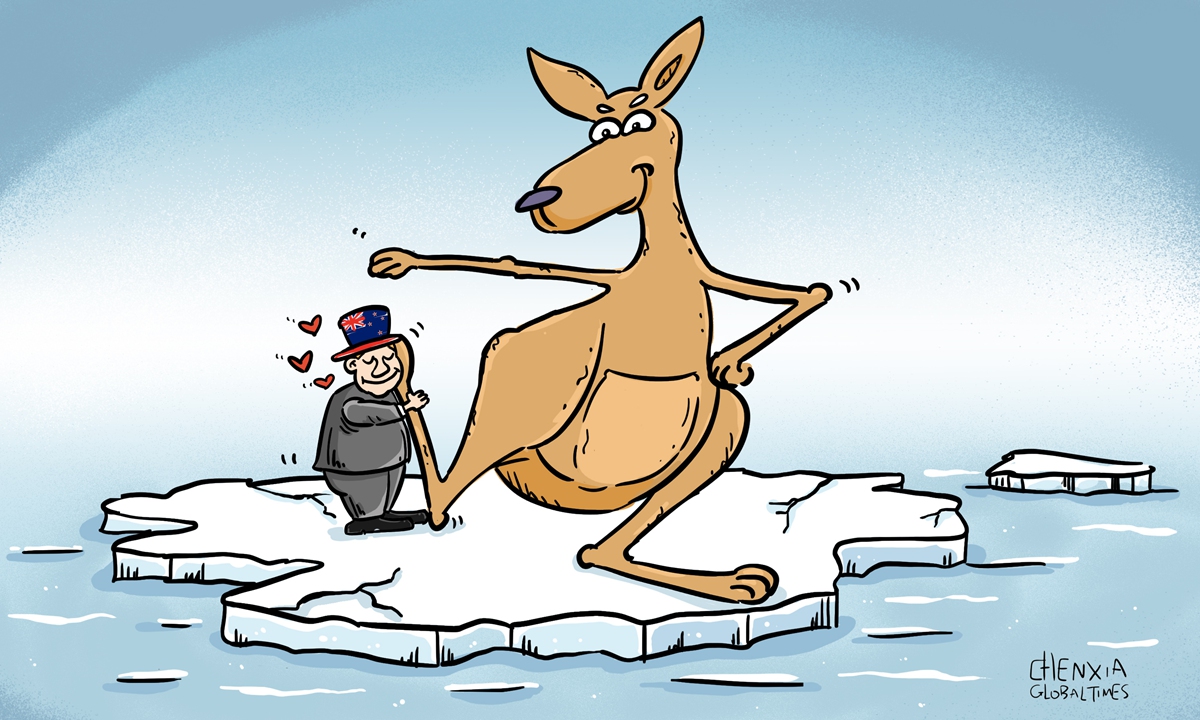Wellington in no position to mediate Beijing-Canberra talks
By Qian Feng Source: Global Times Published: 2020/12/17 18:03:39

Illustration: Chen Xia/GT
New Zealand's new Foreign Minister Nanaia Mahuta said on Tuesday that New Zealand could help negotiate a truce between China and Australia amid the escalating trade and diplomatic spat. She claims "hosting APEC next year might well be the opportunity" for both parties to sit down and talk.Can Wellington really act well as a mediator? No, it cannot.
It is hard for New Zealand, a member of the Five Eyes alliance, to mediate fairly between Australia, its counterpart in the alliance, and China. Besides, the China-Australia dispute was initiated entirely by Canberra - and therefore Australia takes all the responsibility. Considering this, New Zealand really cannot mediate.
When it comes to the picture that Chinese cartoonist Wuheqilin created about Australian soldiers' crimes in Afghanistan, Mahuta still referred to it as "disinformation." This shows that Wellington is just the same as Canberra - adopting double standards on this issue.
It is indisputable that war crimes in Afghanistan committed by Australian soldiers lie squarely on the shoulders of authorities in Canberra. China has simply stood up for justice and made its position public. New Zealand is not in a position to blame China or to mediate - as Wellington is fundamentally in the same boat with Canberra on this issue.
Moreover, New Zealand Prime Minister Jacinda Ardern has publicly voiced support for Australia over the cartoon controversy, showing Western-style arrogance and duplicity.
Australia has made three main moves targeting China so far this year.
First, it has conducted close cooperation with Washington, including participating in regional defense exercises and signing security and defense agreements. Second, it slandered China in various aspects; such as accusing Beijing of carrying out cyber attacks inside Australia, slamming China on the South China Sea issue, and claiming to prevent "China's infiltrating" into Australia. Third, given the fact that China is the main driver of Australia's economic growth, Australia advocates to promote economic diversification and get rid of China's so-called control. We can see how Australia is particularly hostile to China in military, political, security and military spheres.
In the face of its disputes with China, Australia wants to ally itself with other members of the Five Eyes alliance, including New Zealand. Some media reports claim that the alliance is planning sanctions against China. Well, such an attempt is doomed to fail.
Many people in the West hope the incoming Biden administration will meddle in the China-Australia spat. But American politicians will not easily sacrifice their own political interests. Biden will show support for Australia, but the actions will be more symbolic than practical. Biden's offer to restore relations between the US and its allies was motivated by US self-interest, not selflessness.
There are other speculations about the establishment of a so-called economic NATO - an attempt that is even harder to be realized. The wide, deep and complex connection between China and the US as well its allies under the current state of globalization is very different from that between the US and the former Soviet Union. The idea of an economic NATO is fanciful. The Biden team is unlikely to take such a doomed step.
China is still willing to develop good relations with Australia as long as Canberra changes its ways. However, Australia still has not changed. The land down under should take China's advice and not go further down the wrong path. If Australia continues to hurt the feelings of the Chinese people, Chinese consumers will choose to vote with their feet.
The author is director of the research department at the National Strategy Institute at Tsinghua University. opinion@globaltimes.com.cn
Posted in: VIEWPOINT